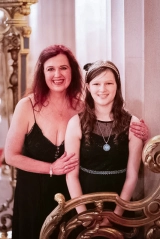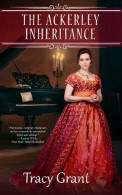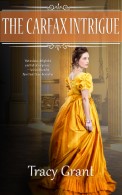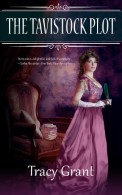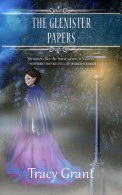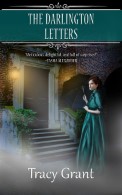 We have a special treat today – the lovely and multi-talented Deanna Raybourn, author the fabulous Lady Julia Grey series of Victorian mysteries, agreed to chat with me about her much-anticipated stand alone novel A Spear of Summer Grass. I recently had the chance for an advanced sneak peek read of this book, and I can report that it is just as rich and wonderful as one would expect of one of Deanna’s novels, filled with vibrant characters and wonderful details of Kenya in the 1920s. One lucky commenter on the interview will have the same opportunity, as Deanna has graciously agreed to give away an advanced copy of the book. The contest closes at 6:00 pm Pacific Time on Thursday, April 18. Let the questions begin!
We have a special treat today – the lovely and multi-talented Deanna Raybourn, author the fabulous Lady Julia Grey series of Victorian mysteries, agreed to chat with me about her much-anticipated stand alone novel A Spear of Summer Grass. I recently had the chance for an advanced sneak peek read of this book, and I can report that it is just as rich and wonderful as one would expect of one of Deanna’s novels, filled with vibrant characters and wonderful details of Kenya in the 1920s. One lucky commenter on the interview will have the same opportunity, as Deanna has graciously agreed to give away an advanced copy of the book. The contest closes at 6:00 pm Pacific Time on Thursday, April 18. Let the questions begin!

TRACY: A Spear of Summer Grass is set in Kenya in the 1920s. After writing a number of books set in the Victorian era, what inspired you to explore this new setting and time period?
DEANNA: My publisher wanted to take a break from the Victorian series, so my editor’s brief to me was, “Pitch us anything, literally ANYTHING, you want to write about.” So I made a list of all the subjects I read about for fun between writing novels. And once I got to twenty or thirty, I circled five that seemed to fit together in an interesting way—Africa, flappers, 1920s, safaris, rose farms. I added in a snippet of an idea I’d had a few years before for a book—about a fairly hardboiled young woman who has a scandalous mother and whose life has been influenced by her mother’s absence—and tossed it all together. I eventually changed rose farm to pyrethrum because it was more appropriate for the time period, and because the floral industry in Kenya is very politically charged right now, and I didn’t want to draw into the story all of the hideous environmental impacts that the flower farms have had on Africa. So, pyrethrum and scandalous flappers it was!
TRACY: Your books have such a wonderful sense of time and place, from sweeping visual vistas to exquisite details of clothing. What were your favorite research sources for A Spear of Summer Grass?
DEANNA: For years I’ve read memoirs of people who lived in Kenya when it was British East Africa. You simply will not find a more colorful, interesting group of people in one place. There were farmers, hunters, debutantes, aristocrats, and criminals, and they all had the same goal—to somehow make a home in what must have felt like the most remote place on earth. And those people wrote memoirs and inspired biographies that make for delicious reading. I also had to amass a collection of history books on Kenya as well as books on the cultures, flora and fauna, etc. But the reading I enjoyed the most was about the people—both the native tribes and the settlers.
TRACY: You recently released a wonderful “prequel” novella, Far in the Wilds, featuring many of the characters in A Spear of Summer Grass. Did you always have the events of that novella in mind or did you later go back and flesh out the backstory?
DEANNA: I didn’t even know there was going to be a novella until after SPEAR was written. I was offered a contract to write a Julia Grey holiday novella, and before we’d even signed the contract, my publisher amended the offer to include three additional Julia novellas and two prequel novellas for my next two stand alone novels. At that point I was casting around for an idea and my editor suggested a novella focusing on Ryder. We happened to be at a conference last summer, and I sat in the hotel lobby scribbling notes for about ten minutes, pitched it to her as she waited for a taxi, and she said, “Write it.” The whole thing took less than a quarter of an hour to plan. Ryder had two really interesting incidents in his backstory that left him with some baggage, and once I hit on an idea of how to tie them together, the novella wrote itself. It was an incredibly smooth process, thank goodness!
TRACY: As a writer of a series, one of the things I enjoy is knowing how my characters talk. After writing a number of books about Lady Julia and Nicholas Brisbane and their friends and family what was it like to explore the voices of a whole new set of characters?
DEANNA: It really was like throwing open the windows and letting in fresh air! Julia and Nicholas inhabit a very specific time and place—late Victorian London. Their lives, unconventional as they are, are confined in certain ways. But Africa and the 1920s and Delilah and Ryder—that was just a wide open space to play in. Plus, I’ve written over half a million words in the Julia series, so creating new voices was just FUN, particularly because Delilah is pretty shameless. She says things aloud that Julia wouldn’t even think!
TRACY: Like your Lady Julia series and your previous standalone, The Dead Travel Fast, A Spear of Summer Grass is written in the first person. What is it you enjoy about writing in this form? How do you find it different from writing in the third person, as you do in Far in the Wilds?
DEANNA: I adore first person point of view, probably because so many of the authors who influenced me used it—Harper Lee, Agatha Christie, Victoria Holt, Elizabeth Peters, Sir Arthur Conan Doyle, Joanne Harris. It gets a bad rap which is absurd. It’s difficult to do well. As a reader and as a writer, I love it for the immediacy it provides. You are pulling someone instantly into that fictional world by offering up a testimony, a confessional, a travelogue, a memoir. It will always be my default because it’s the POV I enjoy reading the most. I did appreciate the challenge of writing the novella in third person, and I’m quite sure I will do it with another novella I’m writing later this year. I’m also plotting out a project which will probably demand third person because some books just cannot be written from a first person perspective.
TRACY: What’s your favorite place to write?
DEANNA: In my tiny pink study. Our house was built in 1940, and as near as we can figure, my study is what used to be the sewing room. It’s very small—eight feet by nine—with no closet and it faces south with excellent light. It has a tiny alcove my husband shelved in for me, and he put up shelves on two other walls. The walls are pink, the ceiling is turquoise, and I hung a small chandelier my great-aunt gave me. I have a copy of the queen’s coronation portrait as well as inspiration boards with rotating displays and a cross-stitched saying of mine that a friend made for me: Be pretty like you mean it. It’s a tiny, wildly feminine room and it’s my favorite spot.
TRACY: Your books have wonderfully intricate plots. Do you work them out in advance or discover things as you go along or a combination of both?
DEANNA: Always a combination. I write out a synopsis of three to five pages for my editor before I begin, and then I pretty much don’t look at it at all when I’m writing. I know I’m starting at point A, and I know I mean to end up at point Z, and I may know what points D, L, and R will be, but everything else is discovery. Because they are mysteries, the Julia books have to have a more linear structure than my stand alones, so I always proceed logically forward with them. The stand alones need a more organic process. I figure them out as I go along, which isn’t my favorite way to write because it’s very much working without a net.
TRACY: I love the Shakespeare references in your books. What’s your favorite Shakespeare play?
DEANNA: No fair! It’s almost too difficult to narrow down because Shakespeare was so incredibly diverse. The solemnity of his histories, the actual human pain in his tragedies—those would be genius enough but then you look at his bawdy side with the truly filthy puns in his comedies and realize this was a man who really could relate to everyone, from the most elevated royal to the lowliest commoner. And he appreciated every kind of struggle—searching for identity, for love, for revenge, for peace. He explored it all! But I will say I have a soft spot for Much Ado About Nothing. There’s a beautiful bit from the play where Beatrice is in conversation with the prince and he says he thinks she was born in a merry hour. And her reply is to tell him no because her mother cried, but that “’there was a star danc’d, and under that was I born.’” I stitched that onto a pillow for my daughter’s crib when she was born because that summed up so beautifully how I felt about her. And that to me is the glory of Shakespeare—that this man who lived centuries ago, writing what was at the time popular entertainment not cultured, highbrow literature, could know and articulate something so beautiful in so few words.
TRACY: I can’t resist asking a variant of a question you asked me. What ten literary characters would you invite to a cocktail party?
DEANNA: Hoist with my own petard! Sir Percy Blakeney, Flora Poste, Elizabeth Bennet, Flavia de Luce, Atticus Finch, Julian Kestrel, Precious Ramotswe, Miss Marple, Vianne Rocher, and Dr. John Watson. I realize we’re at odd numbers there, so I hope the gentlemen won’t mind. And I should point out that if you asked me tomorrow, I’d give you an entirely different set! I’ve also left off some compelling characters who I think would be completely tiresome at the dinner table—Heathcliff, Rochester, Amber St. Clare, Scarlett O’Hara, Sherlock Holmes. I chose Atticus instead of Scout because I already had a young person in Flavia, and I selected Dr. Watson because Holmes always gets all the love but Watson would be a much more congenial guest. I am afraid that Miss Marple might hunker down in a corner over the sherry, but I’m quite sure Precious Ramotswe and Vianne Rocher could draw her out–certainly Julia Kestrel would show her every courtesy! And Percy would be sitting at my right hand for my own personal entertainment. In fact, if I had only Percy, I’m not entirely certain I would miss the other nine…







